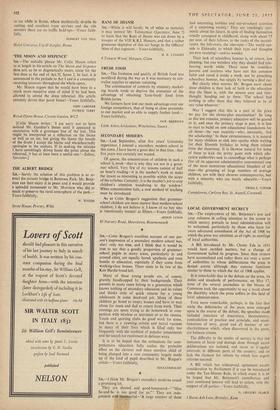LOCAL GOVERNMENT SECRECY SIR,—The employment of Mr. Betjeman's pen and
your columns in calling attention to the extent to which secrecy prevails in local administration will be welcomed, particularly by those who have for years advocated amendment of the Act of 1908 by which the press was admitted, as of right, to meetings of local authorities.
A Bill introduced by Mr. Chuter Ede in 1931 would have rectified matters, but a change of Government halted its progress. Since then arrears have accumulated and today there are over a scare of authorities to whose deliberations •the press is denied access, although they exercise functions similar to those to which the Act of 1908 applies.
It is remarkable that in the debate on the press, its duties and standards of performance, on May 17. none of the several journalists in the House of Commons took the opportunity to say a word about the disability which the press suffers in this field of local administration.
Even more remarkable, perhaps, is the fact that while the deficiencies of the press were enlarged upon in the course of the debate, the speeches made included instances of inaccuracy, inconsistency, contradiction of practice and principle, and mani- -festations of envy, greed and all manner of un- charitableness which, when discovered in the press, are heinous crimes.
The difficulty in the matter of secrecy is that the instances of harm and damage done through secret deliberations are isolated, and occur at ir-egular intervals, in different parts of the country, and so lack the clamour for reform by which less urgent reforms succeed.
A Bill which has widespread. agreement awaits consideration by Parliament if it can be introduced under the Ten-Minute Rule, in which event it is to be hoped that Mr. Betjeman's contribution and your continued interest will lead to action, with the support of all parties.—Yours faithfully, 3 Burnt Ash Lane, Bromley, Kent


































 Previous page
Previous page